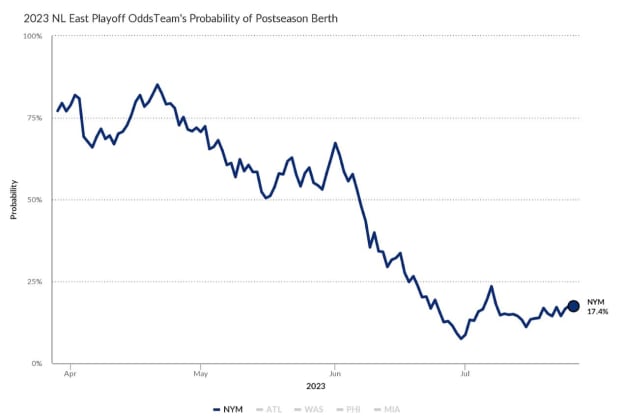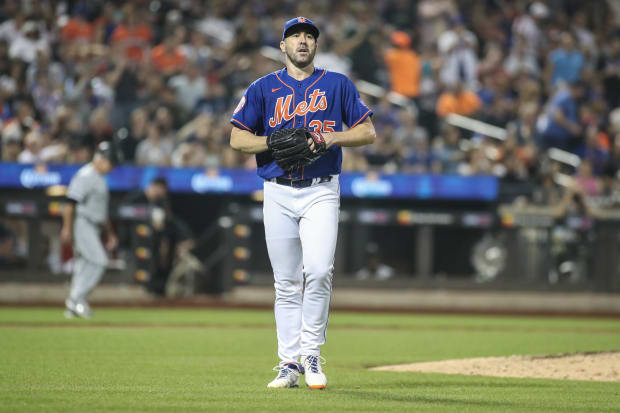With less than a week until the MLB trade deadline, it’s time to analyze some of the most frustrating teams of the season.
We’ll start with (who else?) the Mets.
What’s their deal?
In a vacuum, this season hasn’t been truly dreadful. The Mets have shown moments—whole games, even, if not whole series!—when they have looked like the club they were assembled to be. Pete Alonso is within reach of the NL home run crown despite spending time on the injured list. Francisco Álvarez is enjoying a strong rookie campaign, Brandon Nimmo has been his typical productive self and Tommy Pham is in the midst of his best season in years. There are plenty of legitimate bright spots here … surrounded by maddening issues with starting pitching, a damning lack of depth and inconsistent play all over. The Mets are now closer to last place in the NL East (5.5 games ahead of the Nationals) than third place (6.0 games back of the Phillies). That would be aggravating no matter the context, but for a team with the biggest payroll in baseball, now several years into a new ownership regime and still apparently unable to get out of its own way? Yikes.
How far have they fallen?

Courtesy of FanGraphs
The Mets were never going to have a smooth ride in the NL East. Just look at their competition: The Braves look like a true perennial contender, the Phillies are coming off a trip to the World Series and the Marlins have proved surprisingly pesky. But even with all of that accounted for, New York’s roster was loaded enough to keep it at the front of the conversation here. If the Mets’ preseason odds weren’t quite as high as the Braves’, they were very, very close. Now … their playoff chances have been below 25% since June 19. Even a six-game winning streak before the All-Star break didn’t improve their outlook that much. A full sell-off at the deadline still doesn’t look particularly likely (there’s too much committed here for that), but moving impending free agents such as Pham and Mark Canha seems like the only logical path.
What’s their most emblematic loss?
There are a few good contenders here: Survey this blown save against the Phillies, this failed comeback attempt against the Rockies, this drubbing at the hands of the Brewers. But the real answer has to be this miserable loss in extra innings to the Braves. It started with one of the Mets’ biggest recurring issues—their inability to get out of the first inning unscathed. They have totaled a minus-37 run differential in the first. (Compare that to a plus-26 differential in all other innings combined.) That means plenty of starters getting chased early, complicating the job for the bullpen and setting a generally frustrating tone from the jump. It’s actually a credit to the Mets that they’ve been able to overcome this as often as they have; you’d expect a team with this bad a record in the first inning to lose a lot more games. And yet.

Wendell Cruz/USA TODAY Sports
So, yes, their most emblematic loss would naturally have to start with falling behind in the first. And on June 8 against the Braves, with Justin Verlander on the mound, the Mets finished the first down 3–0. (Credit a two-run homer from Braves third baseman Austin Riley, followed by a run-creating error by Mets outfielder Starling Marte, who’s currently on the injured list.) Verlander ultimately allowed five runs in just three innings of work. This came in the middle of a brief stretch where it looked as if the veteran might have found his footing in New York: In each of his starts before and after this game, Verlander pitched six innings of one-run ball, looking like he’d made a return to form. (He’s seemingly figured out the adjustment since.) But in this one? Five runs, 3.0 IP, 82 pitches.
Yet the Mets came back. Nimmo homered. Álvarez homered twice. By the sixth inning, New York led 10–6. But that still left plenty of baseball to play, and, well, you can see where this one is going. The Mets had to turn to six relievers to cover the rest of the game after Verlander’s departure, and while some were brought out to try for a second inning of work, none managed to complete it, and each allowed multiple base runners. The Mets’ win expectancy had climbed as high as 92%. But the bullpen saw that slip away, bit by bit, until David Robertson blew the save opportunity in the ninth. Finally, with two outs in the 10th, Tommy Hunter gave up a home run to hand it to the Braves.
That is the Mets’ season. Digging an early hole behind maddening starting pitching, mounting a comeback nonetheless and still ultimately watching it fall away. The problem here has never been a total lack of spark. No, this is something more brutal. These Mets are just good enough to keep giving you hope—making it all the more frustrating when they let you down.







